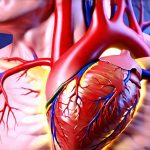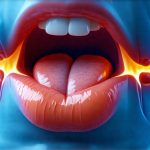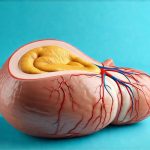Gastroesophageal reflux disease (GERD) is a surprisingly common condition affecting millions worldwide. While many associate GERD primarily with heartburn, its manifestations are often far more diverse and nuanced than just that burning sensation in the chest. One particularly frustrating symptom that frequently accompanies GERD – or even precedes its official diagnosis – is feeling full very quickly after eating only a small amount of food. This early satiety can significantly impact quality of life, making mealtimes stressful and limiting dietary enjoyment. It’s not simply about discomfort; it’s often intertwined with anxiety around eating, concerns about nutritional intake, and the general disruption of everyday activities.
The connection between GERD and this sensation of rapid fullness isn’t always immediately obvious. It stems from a complex interplay between digestive processes, esophageal function, and even psychological factors. The feeling can range from mild discomfort to debilitating bloating and nausea, making it difficult to complete a meal or even contemplate eating again for several hours. Understanding the underlying mechanisms is crucial for identifying potential strategies to manage this symptom and improve overall well-being. It’s important to remember that experiencing these symptoms doesn’t automatically equate to having GERD; other conditions can cause early satiety as well, making accurate diagnosis vital. If is feeling tired after eating is also a concern, it’s best to get checked out by a doctor.
The Link Between Acid Reflux and Stomach Capacity
The primary mechanism behind GERD involves the backflow of stomach acid into the esophagus. This happens when the lower esophageal sphincter (LES), a muscular ring at the bottom of the esophagus, doesn’t close properly. But it’s not just about acid; the entire digestive process can be affected. Chronic reflux can lead to esophagitis, inflammation of the esophageal lining, which in turn impacts its ability to effectively move food downwards. This slowed motility contributes directly to that feeling of fullness.
Furthermore, the constant irritation from acid exposure can cause changes in esophageal sensitivity. The esophagus becomes hypersensitive, meaning it reacts more strongly to even normal amounts of stomach contents. This heightened sensitivity amplifies the sensation of fullness and bloating. It’s a vicious cycle: reflux irritates the esophagus, increasing its sensitivity, which then makes it harder for food to pass through comfortably, potentially leading to increased pressure and more frequent reflux episodes.
Beyond the esophagus itself, GERD can influence stomach emptying rates. The body may attempt to compensate for perceived irritation by slowing down gastric motility – how quickly food moves from the stomach into the small intestine. This slows digestion, increasing the volume of food in the stomach and exacerbating feelings of fullness. It’s a protective mechanism gone awry, ultimately creating more discomfort.
Understanding Gastroparesis & Delayed Gastric Emptying
Gastroparesis, or delayed gastric emptying, is a condition where the stomach doesn’t empty food at a normal rate. While often associated with diabetes, it can also be linked to GERD and chronic acid reflux. The consistent irritation and inflammation caused by reflux can disrupt the vagus nerve, which controls muscle contractions in the digestive system – specifically those responsible for moving food through the stomach.
When the vagus nerve isn’t functioning optimally, the stomach’s peristaltic movements (the wave-like contractions that propel food forward) become weaker and less frequent. This results in food remaining in the stomach longer than it should, causing bloating, nausea, and of course, a pronounced feeling of fullness even after eating small portions. Identifying gastroparesis requires specific diagnostic tests like gastric emptying studies. Managing gastroparesis alongside GERD often involves dietary modifications (smaller, more frequent meals), medication to stimulate gastric motility (prokinetic agents – always prescribed by a doctor), and addressing the underlying reflux with appropriate GERD treatments. If you’ve recently experienced a digestive flare up it’s important to consult your physician.
The Role of Hiatal Hernias in Early Satiety
A hiatal hernia occurs when part of the stomach protrudes up through the diaphragm, into the chest cavity. This often accompanies GERD and can significantly contribute to feelings of fullness and discomfort. A hiatal hernia effectively alters the anatomy of the digestive system, making it easier for acid reflux to occur because the LES is no longer adequately supported by the diaphragm.
The presence of a hernia also physically impacts stomach capacity and function. The portion of the stomach that has herniated can become swollen or inflamed, further reducing the available space within the stomach itself. This leads to quicker feelings of fullness even with minimal food intake. Furthermore, the altered anatomy can disrupt normal gastric emptying, exacerbating delayed digestion and bloating.
Diagnosing a hiatal hernia usually involves endoscopy or imaging studies like barium swallows. Treatment often focuses on managing GERD symptoms – through lifestyle changes, medication, or in some cases, surgery – to prevent further complications and alleviate discomfort associated with the hernia. It’s also helpful to know how to calm your stomach after indulging in foods that might exacerbate symptoms.
Lifestyle Factors & Dietary Adjustments
Many lifestyle factors can worsen both GERD and early satiety. These include: – Eating large meals – Lying down immediately after eating – Consuming fatty or fried foods – Drinking carbonated beverages – Smoking – Being overweight or obese
Dietary adjustments are often the first line of defense in managing these symptoms. – Smaller, more frequent meals can reduce pressure on the stomach and LES. – Avoiding trigger foods (e.g., caffeine, alcohol, spicy foods, chocolate) can minimize reflux episodes. – Eating slowly and chewing food thoroughly aids digestion. – Maintaining a healthy weight reduces abdominal pressure.
Beyond diet, elevating the head of your bed by 6-8 inches during sleep can help prevent nighttime acid reflux. Avoiding tight-fitting clothing can also reduce pressure on the abdomen. Regular exercise (but not immediately after eating) can improve digestive function and overall health. It is important to consult with a healthcare professional for personalized recommendations based on your specific situation. Understanding gut health and anxiety may also help manage some of the psychological effects.
The Psychological Component: Anxiety & Eating
The experience of feeling full after only a few bites isn’t purely physiological; there’s often a significant psychological component, particularly when it occurs in conjunction with GERD. Chronic discomfort and the anticipation of symptoms can lead to anxiety around eating – food fear. This anxiety can manifest as hypervigilance to bodily sensations, making individuals acutely aware of even minor feelings of fullness or bloating, amplifying their perception.
This creates a self-perpetuating cycle: GERD causes discomfort, leading to anxiety about eating, which in turn intensifies the perceived symptoms and further restricts food intake. The fear of experiencing unpleasant symptoms can lead to restrictive eating patterns and a negative relationship with food. This isn’t simply a matter of being “picky” – it’s a genuine psychological response to chronic physical discomfort.
Addressing this requires a multi-faceted approach that includes not only managing the GERD itself but also addressing the anxiety surrounding eating. Cognitive behavioral therapy (CBT) can be incredibly helpful in challenging negative thought patterns and developing coping mechanisms for dealing with anxiety related to food. Mindfulness techniques can also help individuals become more aware of their bodily sensations without judgment, reducing the amplification of symptoms. If you are experiencing a food sensitivity flare-up, it’s important to address both physical and emotional responses.
It’s crucial to remember that seeking support from a healthcare professional – including both a gastroenterologist and potentially a mental health therapist – is essential for effectively managing this complex interplay between physical and psychological factors. Feeling full after just a few bites can be deeply distressing, but with proper diagnosis, treatment, and support, it is possible to regain control of your digestive health and enjoy mealtimes again. If navigating employment during and after treatment is also a concern, remember that you are not alone.


















